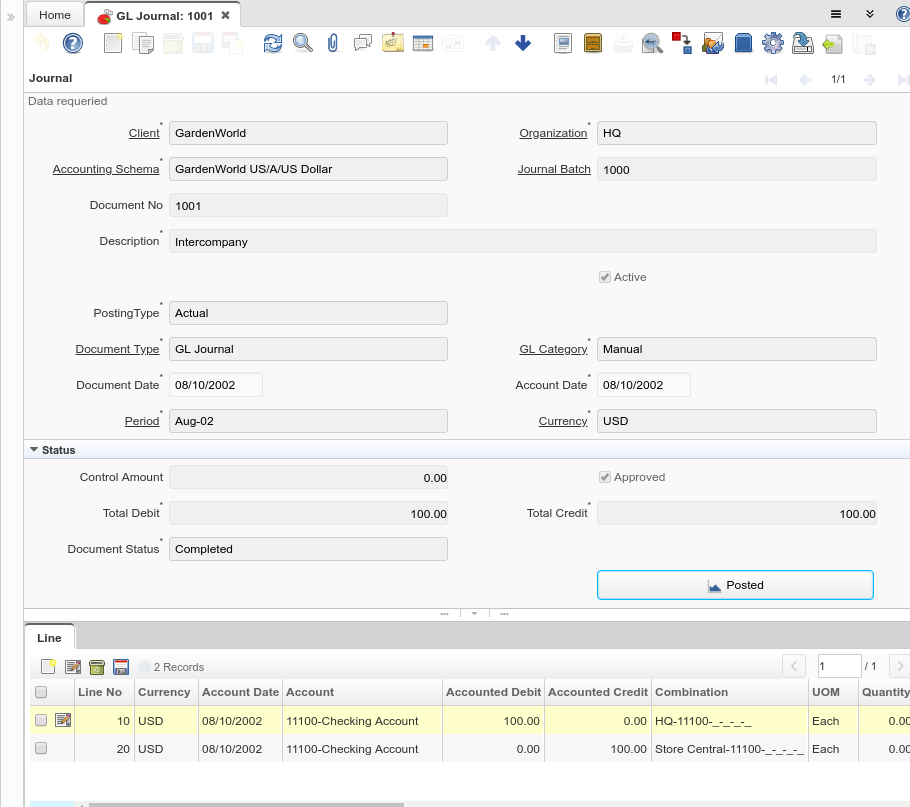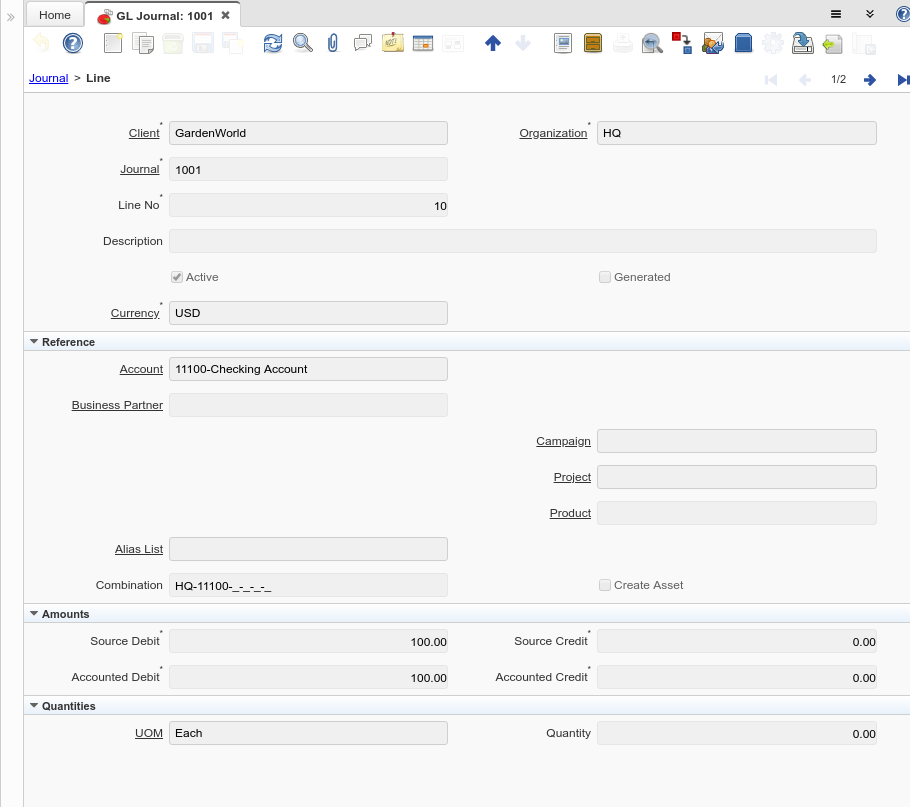GL Journal (Window ID-200005)
Window: GL Journal
Description: Enter and change Manual Journal Entries
Help: The GL Journal Window allows you to enter and modify manual journal entries
Tab: Journal
Description: General Ledger Journal
Help:
| Name | Description | Help | Technical Data |
|---|---|---|---|
| Tenant | Tenant for this installation. | A Tenant is a company or a legal entity. You cannot share data between Tenants. | GL_Journal.AD_Client_ID numeric(10) Table Direct |
| Organization | Organizational entity within tenant | An organization is a unit of your tenant or legal entity - examples are store, department. You can share data between organizations. | GL_Journal.AD_Org_ID numeric(10) Table Direct |
| Accounting Schema | Rules for accounting | An Accounting Schema defines the rules used in accounting such as costing method, currency and calendar | GL_Journal.C_AcctSchema_ID numeric(10) Table Direct |
| Journal Batch | General Ledger Journal Batch | The General Ledger Journal Batch identifies a group of journals to be processed as a group. | GL_Journal.GL_JournalBatch_ID numeric(10) Search |
| Document No | Document sequence number of the document | The document number is usually automatically generated by the system and determined by the document type of the document. If the document is not saved, the preliminary number is displayed in "<>".
If the document type of your document has no automatic document sequence defined, the field is empty if you create a new document. This is for documents which usually have an external number (like vendor invoice). If you leave the field empty, the system will generate a document number for you. The document sequence used for this fallback number is defined in the "Maintain Sequence" window with the name "DocumentNo_<TableName>", where TableName is the actual name of the table (e.g. C_Order). |
GL_Journal.DocumentNo character varying(30) String |
| Description | Optional short description of the record | A description is limited to 255 characters. | GL_Journal.Description character varying(255) String |
| Active | The record is active in the system | There are two methods of making records unavailable in the system: One is to delete the record, the other is to de-activate the record. A de-activated record is not available for selection, but available for reports.
There are two reasons for de-activating and not deleting records: (1) The system requires the record for audit purposes. (2) The record is referenced by other records. E.g., you cannot delete a Business Partner, if there are invoices for this partner record existing. You de-activate the Business Partner and prevent that this record is used for future entries. |
GL_Journal.IsActive character(1) Yes-No |
| Posting Type | The type of posted amount for the transaction | The Posting Type indicates the type of amount (Actual, Budget, Reservation, Commitment, Statistical) the transaction. | GL_Journal.PostingType character(1) List |
| Budget | General Ledger Budget | The General Ledger Budget identifies a user defined budget. These can be used in reporting as a comparison against your actual amounts. | GL_Journal.GL_Budget_ID numeric(10) Table Direct |
| Document Type | Document type or rules | The Document Type determines document sequence and processing rules | GL_Journal.C_DocType_ID numeric(10) Table Direct |
| GL Category | General Ledger Category | The General Ledger Category is an optional, user defined method of grouping journal lines. | GL_Journal.GL_Category_ID numeric(10) Table Direct |
| Document Date | Date of the Document | The Document Date indicates the date the document was generated. It may or may not be the same as the accounting date. | GL_Journal.DateDoc timestamp without time zone Date |
| Account Date | Accounting Date | The Accounting Date indicates the date to be used on the General Ledger account entries generated from this document. It is also used for any currency conversion. | GL_Journal.DateAcct timestamp without time zone Date |
| Period | Period of the Calendar | The Period indicates an exclusive range of dates for a calendar. | GL_Journal.C_Period_ID numeric(10) Table |
| Currency | The Currency for this record | Indicates the Currency to be used when processing or reporting on this record | GL_Journal.C_Currency_ID numeric(10) Table Direct |
| Currency Type | Currency Conversion Rate Type | The Currency Conversion Rate Type lets you define different type of rates, e.g. Spot, Corporate and/or Sell/Buy rates. | GL_Journal.C_ConversionType_ID numeric(10) Table Direct |
| Rate | Currency Conversion Rate | The Currency Conversion Rate indicates the rate to use when converting the source currency to the accounting currency | GL_Journal.CurrencyRate numeric Number |
| Control Amount | If not zero, the Debit amount of the document must be equal this amount | If the control amount is zero, no check is performed.
Otherwise the total Debit amount must be equal to the control amount, before the document is processed. |
GL_Journal.ControlAmt numeric Amount |
| Approved | Indicates if this document requires approval | The Approved checkbox indicates if this document requires approval before it can be processed. | GL_Journal.IsApproved character(1) Yes-No |
| Total Debit | Total debit in document currency | The Total Debit indicates the total debit amount for a journal or journal batch in the source currency | GL_Journal.TotalDr numeric Amount |
| Total Credit | Total Credit in document currency | The Total Credit indicates the total credit amount for a journal or journal batch in the source currency | GL_Journal.TotalCr numeric Amount |
| Document Status | The current status of the document | The Document Status indicates the status of a document at this time. If you want to change the document status, use the Document Action field | GL_Journal.DocStatus character(2) List |
| Process Journal | GL_Journal.DocAction character(2) Button | ||
| Copy Details | Copy Journal/Lines from other Journal | GL_Journal.CopyFrom character(1) Button | |
| Posted | Posting status | The Posted field indicates the status of the Generation of General Ledger Accounting Lines | GL_Journal.Posted character(1) Button |
Tab: Line
Description: General Ledger Journal Line
Help: The GL Journal Line Tab defines the individual debit and credit transactions that comprise a journal.
| Name | Description | Help | Technical Data |
|---|---|---|---|
| Tenant | Tenant for this installation. | A Tenant is a company or a legal entity. You cannot share data between Tenants. | GL_JournalLine.AD_Client_ID numeric(10) Table Direct |
| Organization | Organizational entity within tenant | An organization is a unit of your tenant or legal entity - examples are store, department. You can share data between organizations. | GL_JournalLine.AD_Org_ID numeric(10) Table Direct |
| Journal | General Ledger Journal | The General Ledger Journal identifies a group of journal lines which represent a logical business transaction | GL_JournalLine.GL_Journal_ID numeric(10) Search |
| Line No | Unique line for this document | Indicates the unique line for a document. It will also control the display order of the lines within a document. | GL_JournalLine.Line numeric(10) Integer |
| Description | Optional short description of the record | A description is limited to 255 characters. | GL_JournalLine.Description character varying(255) String |
| Active | The record is active in the system | There are two methods of making records unavailable in the system: One is to delete the record, the other is to de-activate the record. A de-activated record is not available for selection, but available for reports.
There are two reasons for de-activating and not deleting records: (1) The system requires the record for audit purposes. (2) The record is referenced by other records. E.g., you cannot delete a Business Partner, if there are invoices for this partner record existing. You de-activate the Business Partner and prevent that this record is used for future entries. |
GL_JournalLine.IsActive character(1) Yes-No |
| Generated | This Line is generated | The Generated checkbox identifies a journal line that was generated from a source document. Lines could also be entered manually or imported. | GL_JournalLine.IsGenerated character(1) Yes-No |
| Currency | The Currency for this record | Indicates the Currency to be used when processing or reporting on this record | GL_JournalLine.C_Currency_ID numeric(10) Table Direct |
| Account Date | Accounting Date | The Accounting Date indicates the date to be used on the General Ledger account entries generated from this document. It is also used for any currency conversion. | GL_JournalLine.DateAcct timestamp without time zone Date |
| Currency Type | Currency Conversion Rate Type | The Currency Conversion Rate Type lets you define different type of rates, e.g. Spot, Corporate and/or Sell/Buy rates. | GL_JournalLine.C_ConversionType_ID numeric(10) Table Direct |
| Account | Account used | The (natural) account used | GL_JournalLine.Account_ID numeric(10) Search |
| Business Partner | Identifies a Business Partner | A Business Partner is anyone with whom you transact. This can include Vendor, Customer, Employee or Salesperson | GL_JournalLine.C_BPartner_ID numeric(10) Search |
| Trx Organization | Performing or initiating organization | The organization which performs or initiates this transaction (for another organization). The owning Organization may not be the transaction organization in a service bureau environment, with centralized services, and inter-organization transactions. | GL_JournalLine.AD_OrgTrx_ID numeric(10) Table |
| Activity | Business Activity | Activities indicate tasks that are performed and used to utilize Activity based Costing | GL_JournalLine.C_Activity_ID numeric(10) Table |
| Campaign | Marketing Campaign | The Campaign defines a unique marketing program. Projects can be associated with a pre defined Marketing Campaign. You can then report based on a specific Campaign. | GL_JournalLine.C_Campaign_ID numeric(10) Table |
| Sales Region | Sales coverage region | The Sales Region indicates a specific area of sales coverage. | GL_JournalLine.C_SalesRegion_ID numeric(10) Table |
| Project | Financial Project | A Project allows you to track and control internal or external activities. | GL_JournalLine.C_Project_ID numeric(10) Table |
| Sub Account | Sub account for Element Value | The Element Value (e.g. Account) may have optional sub accounts for further detail. The sub account is dependent on the value of the account, so a further specification. If the sub-accounts are more or less the same, consider using another accounting dimension. | GL_JournalLine.C_SubAcct_ID numeric(10) Table Direct |
| Product | Product, Service, Item | Identifies an item which is either purchased or sold in this organization. | GL_JournalLine.M_Product_ID numeric(10) Search |
| Location From | Location that inventory was moved from | The Location From indicates the location that a product was moved from. | GL_JournalLine.C_LocFrom_ID numeric(10) Search |
| Location To | Location that inventory was moved to | The Location To indicates the location that a product was moved to. | GL_JournalLine.C_LocTo_ID numeric(10) Search |
| User Element List 1 | User defined list element #1 | The user defined element displays the optional elements that have been defined for this account combination. | GL_JournalLine.User1_ID numeric(10) Search |
| User Element List 2 | User defined list element #2 | The user defined element displays the optional elements that have been defined for this account combination. | GL_JournalLine.User2_ID numeric(10) Search |
| Alias List | Valid Account Alias List | The Combination identifies a valid combination of element which represent a GL account. | GL_JournalLine.Alias_ValidCombination_ID numeric(10) Table |
| Rate | Currency Conversion Rate | The Currency Conversion Rate indicates the rate to use when converting the source currency to the accounting currency | GL_JournalLine.CurrencyRate numeric Number |
| Combination | Valid Account Combination | The Combination identifies a valid combination of element which represent a GL account. | GL_JournalLine.C_ValidCombination_ID numeric(10) Account |
| Create Asset | GL_JournalLine.A_CreateAsset character(1) Yes-No | ||
| Asset | Asset used internally or by customers | An asset is either created by purchasing or by delivering a product. An asset can be used internally or be a customer asset. | GL_JournalLine.A_Asset_ID numeric(10) Search |
| Asset Group | Group of Assets | The group of assets determines default accounts. If an asset group is selected in the product category, assets are created when delivering the asset. | GL_JournalLine.A_Asset_Group_ID numeric(10) Table Direct |
| Source Debit | Source Debit Amount | The Source Debit Amount indicates the credit amount for this line in the source currency. | GL_JournalLine.AmtSourceDr numeric Amount |
| Source Credit | Source Credit Amount | The Source Credit Amount indicates the credit amount for this line in the source currency. | GL_JournalLine.AmtSourceCr numeric Amount |
| Accounted Debit | Accounted Debit Amount | The Account Debit Amount indicates the transaction amount converted to this organization's accounting currency | GL_JournalLine.AmtAcctDr numeric Amount |
| Accounted Credit | Accounted Credit Amount | The Account Credit Amount indicates the transaction amount converted to this organization's accounting currency | GL_JournalLine.AmtAcctCr numeric Amount |
| UOM | Unit of Measure | The UOM defines a unique non monetary Unit of Measure | GL_JournalLine.C_UOM_ID numeric(10) Table Direct |
| Quantity | Quantity | The Quantity indicates the number of a specific product or item for this document. | GL_JournalLine.Qty numeric Amount |


